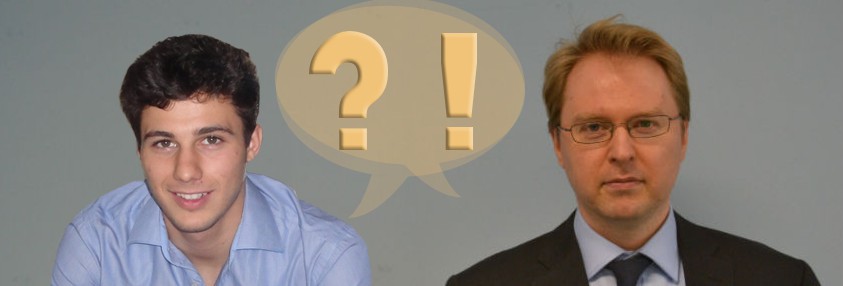
Ever wondered how your professors and teachers see Europe and its future? Then lets conduct an interview with them! Spotlight Europe supports you when you want to do an interview. Georgi (21) goes to Lancaster University and has met with his professor Dr. Martin Steven.
Georgi: Who is Dr. Martin Steven?
Prof. Steven: I am a lecturer in political science at Lancaster University, UK, and also the convener for postgraduate studies in Politics. My research interests fall within the area of comparative government, especially the European Union. I have published around 20 articles and books on the role of political parties and interest groups in the public policy process, including projects focusing on multi-level governance, electoral system design and social policy issues. I have also worked in the past in the public and not-for-profit sector, including for a London-based NGO.
Georgi: The news about the Scottish independence referendum is gradually fading away, but how likely is it to have another one in a couple of decades?
Prof. Steven: There is a chance – at present, the Scottish National Party is enjoying a lot of popularity in the opinion polls. The SNP would need to win an outright majority at the next Scottish elections in 2016 to bring forward a new referendum in the near future. We know from studying similar cases such as Quebec in Canada and Catalonia in Spain that nationalism has a tendency not to go away completely, but develop in different forms. Yet if support for independence in Catalonia is presently strong, support for it in Quebec is presently relatively low so we will have to wait and see in which direction Scotland heads.
Georgi: Do you believe that the EU gave Greece loans which it knew could not be repaid without taking new ones and in a way put the Hellenic Republic in a vicious circle?
Prof. Steven: I am not sure the EU has done anything too unreasonable – the Greek economy needed to be bailed out due to excessive public expenditure, and the Commission, the Central Bank and the International Monetary Fund stepped in to help. While it is reasonable for many ordinary Greek voters to feel disillusioned with aspects of EU economic policy, it is not really fair for the new Syriza government to suggest that the problems are all the responsibility of Brussels.
Georgi: Where will the enlargement process of the EU end? Do you think that Turkey should ever become an EU member state?
Prof. Steven: It used to be that the answer to this question was ‘no’ as European leaders appeared to be intent on widening and deepening their borders as much as possible – but the context is quite different now. The Eurozone crisis has really affected confidence in an ‘ever closer union’, even amongst those who believe that EU integration has no reverse gear. Turkey has been a candidate country for European membership for many years – and I do not think that will change any time soon due primarily to the size of its population.
Georgi: How do you imagine Europe in the year 2065? Will the EU survive?
Prof. Steven: It is a good question – the former British Prime Minister Harold Wilson once said that ‘a week is a long time in politics’… We can be confident that the government of Europe will be reformed quite a lot over the next few years. There may well develop a type of two tier European Union, one with the Euro (and therefore also fiscal union) and one outside the Eurozone that resembles more of a free trade area. But it is difficult to see the European Union not surviving in some form as different European countries have too much in common both economically and culturally to not work together politically.
Visit Prof. Dr. Steven´s website for more information about him. (Site)
About the interviewer:

Georgi (21) participated in our workshop in Sofia, Bulgaria, in 2012. He currently studies Politics and International Relations at University of Lancaster in England.
